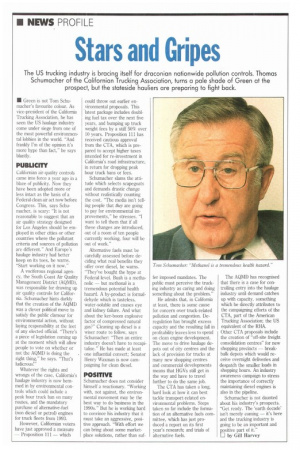Stars and Gripes
Page 28

If you've noticed an error in this article please click here to report it so we can fix it.
The US trucking industry is bracing itself for draconian nationwide pollution controls. Thomas Schumacher of the Californian Trucking Association, turns a pale shade of Green at the prospect, but the stateside hauliers are preparing to fight back.
• Green is not Tom Schumacher's favourite colour. As vice-president of the California Trucking Association, he has seen the US haulage industry come under siege from one of the most powerful environmental lobbies in the world. "And frankly I'm of the opinion it's more hype than fact," he says bluntly.
PUBLICITY
Californian air-quality controls came into force a year ago in a blaze of publicity. Now they have been adopted more or less intact as the basis of a Federal clean air act now before Congress. This, says Schumacher, is scary: "it is not reasonable to suggest that an air quality strategy designed for Los Angeles should be employed in other cities or other countries where the pollutant criteria and sources of pollution are different." And Europe's haulage industry had better keep on its toes, he warns. "Start working on it now."
A vociferous regional agency, the South Coast Air Quality Management District (AQMD), was responsible for drawing up air quality controls for California. Schumacher hints darkly that the creation of the AQMD was a clever political move to satisfy the public clamour for environmental action, without laying responsibility at the feet of any elected official. "There's a piece of legislation coming up at the moment which will allow people to vote on whether or not the AQMD is doing the right thing," he says. "That's ludicrous!"
Whatever the rights and wrongs of the case, California's haulage industry is now hemmed in by environmental controls which could include a peak hour truck ban on many routes, and the mandatory purchase of alternative-fuel (non diesel or petrol) engines for truck fleets from 1993.
However, Californian voters have just approved a measure — Proposition 111 — which could throw out earlier environmental proposals. This latest package includes doubling fuel tax over the next five years, and bumping up truck weight fees by a stiff 50% over 10 years. Proposition 111 has received cautious approval from the CTA, which is prepared to accept higher taxes intended for re-investment in California's road infrastructure, in return for dropping peak hour truck bans or fees.
Schumacher slams the attitude which selects scapegoats and demands drastic change without realistically counting the cost. "The media isn't telling people that they are going to pay for environmental improvements," he stresses. "I want to tell them that if all these changes are introduced, out of a room of ten people currently working, four will be out of work."
Alternative fuels must be carefully assessed before deciding what real benefits they offer over diesel, he warns. "They've bought the hype at Federal level. Bush is a methanolic — but methonal is a tremendous potential health hazard. A by-product is formaldehyde which is tasteless, water-soluble and causes eye and kidney failure. And what about the ker-boom explosive factor of compressed natural gas?" Cleaning up diesel is a wiser route to follow, says Schumacher: "Then an entire industry doesn't have to recapitalise." He has made at least one influential convert; Senator Henry Waxman is now campaigning for clean diesel.
POSITIVE
Schumacher does not consider himself a reactionary. "Working with, not against, the environmental movement may be the best way to do business in the 1990s." But he is working hard to convince his industry that it must take an aggressive, positive approach. "With effort we can bring about some marketplace solutions, rather than suf fer imposed mandates. The public must perceive the trucking industry as caring and doing something about the problem."
He admits that, in California at least, there is some cause for concern over truck-related pollution and congestion. Deregulation has brought excess capacity and the resulting fall in profitability leaves less to spend on clean engine development. The move to drive haulage depots out of city centres and the lack of provision for trucks at many new shopping centres and commercial developments means that HGVs still get in the way and have to travel further to do the same job.
The CIA has taken a long, hard look at how it can best tackle transport-related environmental problems. Steps taken so far include the formation of an alternative fuels committee, which has just produced a report on its first year's research; and trials of alternative fuels. The AQMD has recognised that there is a case for controlling entry into the haulage industry until demand catches up with capacity, something which he directly attributes to the campaigning efforts of the CTA, part of the American Trucking Association; the US equivalent of the RHA.
Other CTA proposals include the creation of "off-site freight consolidation centres" for new shopping precincts — breakbulk depots which would receive overnight deliveries and despateh the smaller loads in shopping hours. An industry awareness campaign to stress the importance of correctly maintaining diesel engines is also in the pipeline.
Schumacher is not daunted about his industry's prospects. "Get ready. The 'earth decade' isn't merely coming — it's here and the trucking industry is going to be an important and positive part of it."
IL by Gill Harvey








































































































































